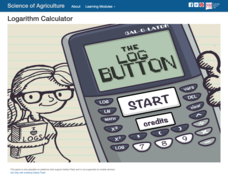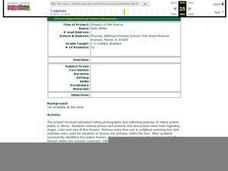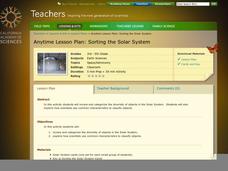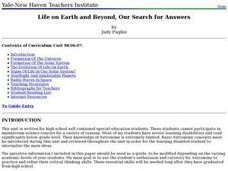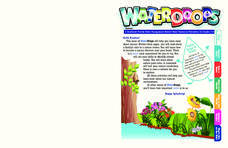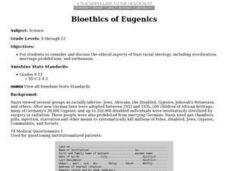Curated OER
Go Bug!
Second graders explore the lives of insects by participating in a card game. In this metamorphosis lesson, 2nd graders define several scientific vocabulary terms associated with insects and identify the different life cycles associated...
California Academy of Science
Make your own Antelope Horns!
What are those horns for anyway? Little ones discuss the shape, texture, and purpose of horns found on animals such as the deer and antelope. They then pair up and make their own set of antelope horns to wear while visiting a local...
TED-Ed
The Fundamentals of Space-Time: Part 3
If you weren't already blown away by first two installments, check out this clip on how gravity and space-time interact! Our physicist friends, Pontzen and Whyntie, continue their discussion of these motion concepts for your high...
Learning Games Lab
Logarithm Calculator
Support your young scientists' knowledge of logarithms with a quick video lesson. The instruction first presents the relationship between a base-10 logarithm and an exponential equation. It then demonstrates how to use a calculator to...
Curated OER
Ready-Set-Tech: When a Volcano Erupts
Wouldn't it be a blast to uncover the science behind volcanic eruptions? Explore, research, and examine the nature of volcanoes with three fun hands-on projects kids will love. First the class takes to the Internet to research volcanoes....
Curated OER
Flowera of the Prairie
Young scholars with severe disabilities view pictures of flowers in a scanning box and identify them. Outside, they locate flowers on the school's property, label and care for them. Students use flower pictures to aid identification.
Curated OER
Plotting Earthquakes: Diversity of Learner Adaptation
Students are divided into four groups that study four separate ecosystems in the community. They first do a field examination for the purpose of developing a detailed report of an ecosystem. Students do a detailed analysis of the...
Curated OER
The Best Place in the United States to Live
Learners, working in small groups, analyze information provided in U.S. maps to make a logical determination of the best place to live in the United States in regards to natural and human-made hazards. Then, working individually, they...
Curated OER
My Feet
Students examine the various parts of the feet. They listen to the book, My Feet, by Aliki, discuss the different parts and purposes of the foot, trace one of their feet on paper, and compare the foot tracing to another tracing several...
Curated OER
Turning the Tide on Trash: Marine Debris Curriculum
Seven pages of fascinating reading on marine debris preface the activities in this lesson plan. Four different activities are employed to simulate how the debris is distributed in the ocean and along beaches. Early ecology learners...
Pennsylvania State University
Learn, Protect, and Promote Water
A hands-on activity helps learners explore the water cycle. After discussing how they use water, classes discuss water pollution and then move into a simulation where 20 pupils move through the water cycle based on description cards.
Curated OER
Turning the Tide on Trash: Marine Debris Curriculum
Six different lessons comprise this unit on marine debris. Science, language arts, social studies, and art projects make this an ideal interdisciplinary unit. The result will be well-informed future citizens who can help make a...
Curated OER
Build a Coral Polyp
Students build a coral polyp out of a banana, straw, oyster crackers, sprinkles, and more. In this coral polyp lesson plan, students also list the differences between plants and animals.
California Academy of Science
Sorting the Solar System
Scientists are always sorting and classifying objects based on their characteristics. In a hands-on learning activity, young space explorers work together to categorize solar system cards based on their properties. It is up to the young...
California Academy of Science
Natural Resources Bingo
Bingo isn't just a silly game, it's a great way to practice all types of skills. After reviewing that the earth is composed of natural resources, what those natural resources are, and sustainability, the class plays a game of bingo. The...
US Department of Energy
Electric Avenue: Parallel and Series Circuits
Can you infer the wiring diagram of a series of lights based on their behavior alone? Scholars work with multiple boxes of four lights. They must flip the switch and decide how the lights are wired. By applying their knowledge of...
Learning Games Lab
Scientific Graph Reading
Interpreting graphs is an essential skill for young scientists. An interactive online lesson gives individuals an opportunity to review the components of a graph and learn to read and interpret the shape of a graph. The lesson includes...
Learning Games Lab
The Magic of Reading Graphs
Making conclusions from graphs doesn't need to seem like magic. Learners explore an interactive lesson on reading graphs to strengthen their skills. The content discusses how to read the axes of a graph and draw conclusions based on the...
Curated OER
Coral Polyp Party
Students complete a project where they label the parts of a coral polyp and discuss the differences between plants and animals. Students use marshmallows, sprinkles, toothpicks, and more to label their coral polyp.
Curated OER
Life on Earth and Beyond, Our Search for Answers
Students in a special education classroom are introduced to how the universe and solar system was formed. Using the internet, they research the characteristics of Earth that support human life. In groups, they compare and contrast...
Curated OER
Waterdrops
In this environment worksheet, students read an article about water drops and the nature center. They pretend that they are going to a nature center and write what they would hope see there. Students also identify living things and...
Curated OER
Bioethics of Eugenics
Pupils research and discuss the ethical aspects of Nazi racial ideology, including sterilization, marriage prohibitions, and euthanasia. They develop codes of ethics regarding reproductive rights, euthanasia, and the death penalty.
Curated OER
The Resistor Color Code and Reading a Multi-meter.
Students explore how to read the resistor color code and a meter.
Curated OER
Lesson 18, My Friend Linda
Students explore Huntington's Disease. In this biology lesson plan, students read My Friend Linda and examine the ethical issues brought to light in the story. Students discuss biotechnology issues and genetic testing.
Other popular searches
- Severely Disabled Game
- Severely Disabled Reading
- For Severely Disabled
- Severely Disabled Preschool
- Severely Disabled Music
- Severely Disabled Art
- Severely Disabled Lesson
- Severely Disabled p.e.
- Severely Disabled Pe





